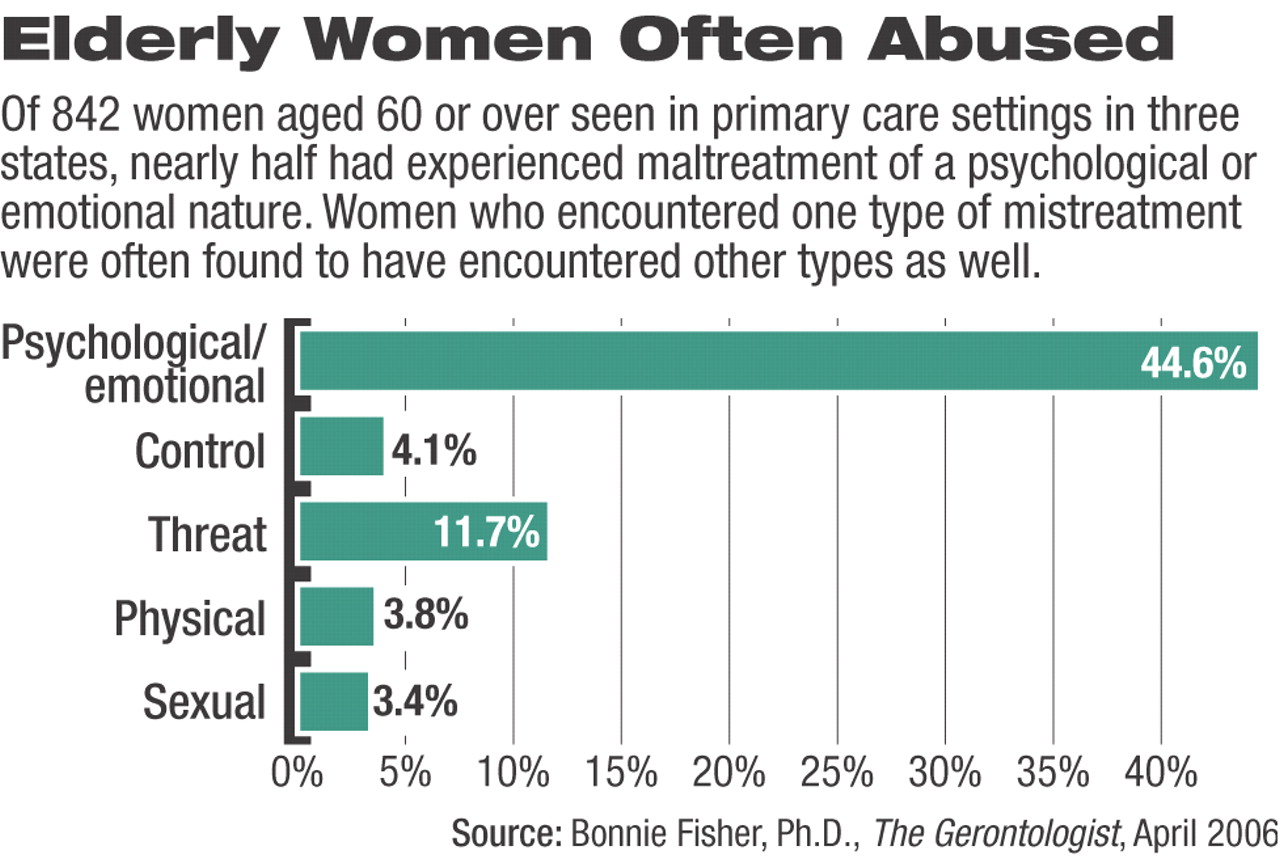While abuse of younger women has been widely scrutinized, this is not the case for abuse of older women. So University of Cincinnati researchers Bonnie Fisher, Ph.D., a professor of criminal justice, and Saundra Regan, Ph.D., a research associate in family medicine, decided to investigate the subject.
Almost half of all older women they studied had been mishandled in one or more ways, they reported in the April Gerontologist.
In 2003 they obtained the names of women aged 60 or older affiliated with one of five primary care clinics in Kentucky, Indiana, or Ohio. They then surveyed 842 of the women, using a validated instrument called the Women's Health and Relationship Survey. The women were asked whether they had been abused since turning age 55 and, if so, how often and by whom.

Abuse was broken down in the survey questionnaire into five categories—psychological/emotional, control, threat, physical, and sexual. Each of these five categories was further broken down into two to four distinct behaviors. For example, psychological/emotional abuse was characterized by “called you a name or criticized you,”“ shouted or swore at you,” or “been possessive or jealous of someone close to you.” Control abuse was characterized by“ routinely checked up on you in a way that made you afraid,”“ put you on an allowance,” or “not letting you go to work or social activities or see or talk with your friends.” Thus, if a woman endorsed one or more behaviors within a particular abuse category, she was considered to have experienced that particular category of abuse.
Nearly half (47 percent) of the women had experienced at least one kind of abuse since turning age 55. Forty-five percent had been psychologically/emotionally abused, 12 percent had been threatened, 4 percent had been controlled, 4 percent had been physically abused, and 3 percent had been sexually abused.
Of women who experienced a specific category of abuse, many also incurred it frequently. Women who encountered one category of mistreatment were often found to have encountered other categories as well.
The perpetrators of the maltreatment included spouses, boyfriends, children, grandchildren, other relatives, and nonrelatives.
Fisher and Regan also asked the women about their current mental and physical health. They then looked to see whether certain categories of abuse could be linked with specific mental or physical health problems, even when age, race, education, and some other possibly confounding factors were taken into consideration.
Women who had suffered any type of abuse were almost twice as likely to experience anxiety and depression as were women who had not been abused. Further, women who had been psychologically/emotionally abused were likely to experience not just anxiety or depression, but also digestive problems, high blood pressure, heart problems, or chronic pain. The chances of their having digestive problems and chronic pain spiked even further if they were abused repeatedly.
Although the cross-sectional nature of the study does not allow one to conclude definitively that abuse, especially psychological/emotional abuse, can erode older women's mental and physical health, Fisher and Regan suspect that it can.
Moreover, “the issues of abuse [for older women] and its health consequences will not retreat any time soon,” they warned in their study report. “Older women are a fast-growing population as the baby boomers enter old age and their life expectancy continues to lengthen.”
The results have other implications as well. When women are abused by their husbands, Regan explained in an interview, the maltreatment often starts out as physical, but then, as the years go by, it becomes more psychological and emotional. As a result, many of those women don't identify psychological and emotional denigration as real abuse.
“That bothers me,” said Regan. “So I think there needs to be more education about what actually constitutes abuse.”
And the education, she added, should be directed not just to women being assailed psychologically/emotionally, but to adult protective agencies that usually focus on physical abuse and neglect of seniors, not on the psychological and emotional mistreatment of them.
The study was funded by the Attorney General of Ohio.

